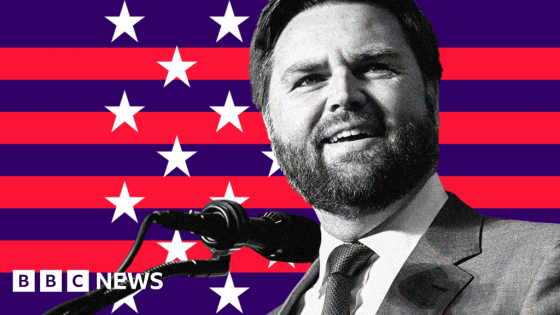“I’m a ‘never Trump’ guy. I never liked him.”
“My god what an idiot.”
“I find him reprehensible.”
That was from JD Vance in interviews and on Twitter in 2016, when the publication of his memoir Hillbilly Elegy catapulted him to fame.
A few short years later, Mr Vance transformed himself into one of Trump’s steadfast allies.
And a few years after that the first-term senator from Ohio is now by Trump’s side as vice presidential running mate – and, by extension, an early frontrunner for the Republican presidential nomination in 2028.
In fact, Mr Vance has made something of a habit of transformation. How did he emerge from a tough upbringing to reach the highest levels of American politics?
Mr Vance was born James David Bowman in Middletown, Ohio, to a mother who struggled with addiction and a father who left the family when JD was a toddler.
He was raised by his grandparents, “Mamaw” and “Papaw”, whom he sympathetically portrayed in his 2016 memoir Hillbilly Elegy.
Although Middletown is located in rust-belt Ohio, Mr Vance identified closely with his family’s roots slightly to the south in Appalachia, the vast mountainous inland region that stretches from the Deep South to the fringes of the industrial Midwest. It includes some of the country’s poorest areas.
Mr Vance painted an honest portrait of the trials, travails and bad decisions of his family members and friends. And his book also took a decidedly conservative view – describing them as chronic spendthrifts, dependent on welfare payments and mostly failing to pull themselves up by their bootstraps.
He wrote that he saw Appalachians “reacting to bad circumstances in the worst way possible” and that they were products of “a culture that encourages social decay instead of counteracting it”.
“The truth is hard,” he wrote, “and the hardest truths for hill people are the ones they must tell about themselves.”
While he poured scorn on “elites” and exclusive society, he painted himself as a counterpoint to the chronic failure of those he grew up with.
By the time the book came out, Mr Vance’s own bootstrap tugging had slung him far away from Middletown: first to the US Marines and a tour of duty in Iraq, and later to Ohio State University, Yale Law School and a job as a venture capitalist in California.
Hillbilly Elegy made him not only into a bestselling author, but a sought-after commentator who was frequently called upon to explain Donald Trump’s appeal to white working-class voters, and he rarely missed an opportunity to criticise then then-Republican nominee.
“I think this election is really having a negative effect especially on the white working class,” he told an interviewer in October 2016.
“What it’s doing is giving people an excuse to point the finger at someone else, point the finger at Mexican immigrants, or Chinese trade or the Democratic elites or whatever else.”
In 2017 Mr Vance returned to Ohio and continued to work in venture capital. He and his wife, Usha Chilukuri Vance, whom he met at Yale, have three children.
His name was long whispered about as a political candidate, and he saw an opportunity when Ohio’s Republican senator Rob Portman decided not to run for re-election in 2022.
Although his campaign was initially slow to get going, he got a kick-start via a $10m (£7.7m) donation by his former boss, Silicon Valley power broker Peter Thiel. But the real hurdle stopping him from getting elected in increasingly Republican Ohio was his past criticism of Trump.
He apologised for his previous remarks and managed to mend fences and earn Trump’s endorsement, pushing him to the top of the Republican field and eventually into the Senate.
In the process, Mr Vance has become an increasingly important player in the world of Make America Great Again politics – and has signed up almost completely to Trump’s agenda.
In the Senate he has been a reliable conservative vote, backing populist economic policies and emerging as one of the biggest congressional sceptics of aid to Ukraine.
Mr Vance, who was baptized as a Catholic in 2019, is anti-abortion, but has recently backed Trump’s view that the matter should be left up to individual states to decide.
Source Agencies


